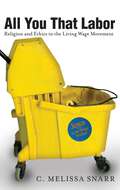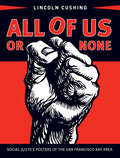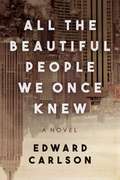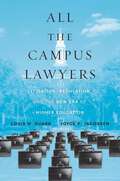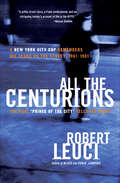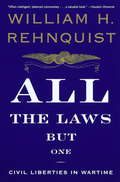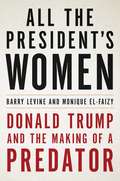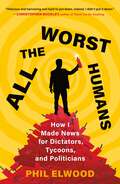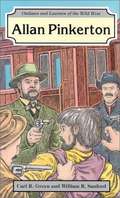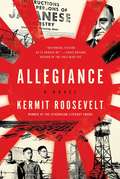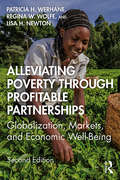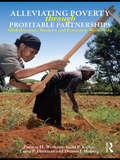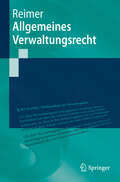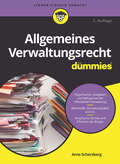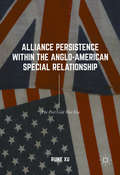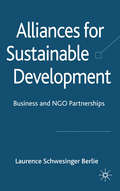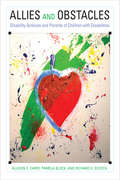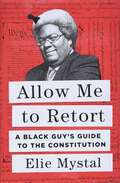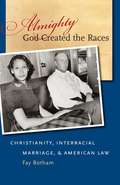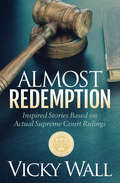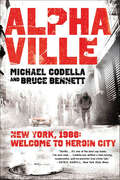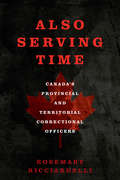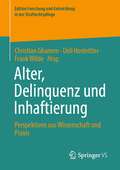- Table View
- List View
All You That Labor: Religion and Ethics in the Living Wage Movement (Religion and Social Transformation #10)
by C. Melissa Snarr“Come to me, all you that labor and are heavy laden, and I will give you rest.”Mathew 11:28 (AKJV)In the early 1990s, a grassroots coalition of churches in Baltimore, Maryland helped launch what would become a national movement. Joining forces with labor and low-wage worker organizations, they passed the first municipal living wage ordinance. Since then, over 144 municipalities and counties as well as numerous universities and local businesses in the United States have enacted such ordinances.Although religious persons and organizations have been important both in the origins of the living wage movement and in its continuing success, they are often ignored or under analyzed. Drawing on participant observation in multiple cities, All You That Labor analyzes and evaluates the contributions of religious activists to the movement. The book explores the ways religious organizations do this work in concert with low-wage workers, the challenges religious activists face, and how people of faith might better nurture moral agency in relation to the political economy. Ultimately, C. Melissa Snarr provides clarity on how to continue to cultivate, renew, and expand religious resources dedicated to the moral agency of low-wage workers and their allies.
All of Us or None: Social Justice Posters of the San Francisco Bay Area
by Lincoln CushingThis long-awaited catalog of political posters pays homage to an influential and populist art movement that has created some of the most enduring imagery of our time. In All of Us or None, author Lincoln Cushing examines key selections from a remarkable archive of over 24,000 posters amassed by free speech movement activist, author, and educator Michael Rossman over the course of thirty years. This inspiring collection of Bay Area posters illuminates the history of this ad-hoc and ephemeral art form, celebrating its unique capacity to infuse contemporary issues with the urgency and energy of the eternal fight for justice.
All the Beautiful People We Once Knew: A Novel
by Edward CarlsonFor fans of Don DeLillo and Joseph O’Neill, an enthralling debut about the one percent, what they’ll do to stay on top, and the callous gaze they turn on those below them.Burned-out and alienated, Kilgore associate attorney Stephen Harker spends his work days defending insurance companies against spurious litigation commenced by private soldiers who supported US military operations in Iraq and Afghanistan. Harker’s charismatic, womanizing boss assigns him a case defending insurance behemoth WorldScore against a lawsuit filed by Major Mike "Bud" Thomas, a veteran, former contract soldier, and divorced father seeking compensation for PTSD and injuries suffered in Afghanistan. Just as Harker turns the firm’s full legal power on the wounded, unstable veteran, he commences an unhealthy relationship with his boss’s estranged bohemian wife, setting himself up for a downward existential spiral that almost destroys Harker, until a brutal act of violence presents him with a final shot at redemption.All the Beautiful People We Once Knew is a riveting insider's indictment of the world of the corporate elite and the savage determination with which they fight to maintain control. In a society where the very institutions that should support our returning veterans instead view them with suspicion, this stunning debut is a grim reflection on the ever-growing rift between the classes.
All the Campus Lawyers: Litigation, Regulation, and the New Era of Higher Education
by Joyce P. Jacobsen Louis H. GuardHow colleges and universities can respond to legal pressures while remaining true to their educational missions.Not so long ago, colleges and universities had little interaction with the law. In the 1970s, only a few well-heeled universities even employed in-house legal counsel. But now we live in the age of tenure-denial lawsuits, free speech battles, and campus sexual assault investigations. Even athletics rules violations have become a serious legal matter. The pressures of regulation, litigation, and legislation, Louis Guard and Joyce Jacobsen write, have fostered a new era in higher education, and institutions must know how to respond.For many higher education observers and participants, including most administrators and faculty, the maze of legal mandates and potential risks can seem bewildering. Guard, a general counsel with years of higher education law experience, and Jacobsen, a former college president, map this unfamiliar terrain. All the Campus Lawyers provides a vital, up-to-date assessment of the impact of legal concerns on higher education and helps readers make sense of the most pressing trends and issues, including civil rights; free speech and expression; student life and wellness; admissions, advancement, and community relations; governance and oversight; the higher education business model; and on-campus crises, from cyberattacks to pandemics.As well as informing about the latest legal and regulatory developments affecting higher education, Guard and Jacobsen offer practical guidance to those in positions of campus authority. There has never been a more crucial time for college and university boards, presidents, inside and outside counsel, and other higher education leaders to know the law and prepare for legal challenges.
All the Centurions: The Real "Prince of the City" Tells His Story
by Robert LeuciThe bestselling book and acclaimed film Prince of the City told only part of Robert Leuci's story. In All the Centurions, he shares the full account of his years as a narcotics detective with the New York Police Department -- a tale of daring adventure, shattered illusions, and finally, astonishing spiritual growth.Leuci reminisces about cops both celebrated and notorious, like Frank Serpico, Sonny Grosso, and Frank King from the French Connection case. Also here are politicians, Mafia figures, corrupt defense lawyers, and district attorneys, including a young Rudolph Giuliani. Leuci reveals the dark side of the criminal justice system: the bitterness, greed, cruelty, and ambition that eventually overflowed into the streets, precinct houses, and courtrooms of the city.As vivid and entertaining as the best crime novels, All the Centurions is the story of a man descending into a hell of his own making who ultimately finds his way out through truth and justice.
All the Laws but One
by William H. RehnquistInAll the Laws but One, William H. Rehnquist, Chief Justice of the United States, provides an insightful and fascinating account of the history of civil liberties during wartime and illuminates the cases where presidents have suspended the law in the name of national security. Abraham Lincoln, champion of freedom and the rights of man, suspended the writ of habeas corpus early in the Civil War--later in the war he also imposed limits upon freedom of speech and the press and demanded that political criminals be tried in military courts. During World War II, the government forced 100,000 U. S. residents of Japanese descent, including many citizens, into detainment camps. Through these and other incidents Chief Justice Rehnquist brilliantly probes the issues at stake in the balance between the national interest and personal freedoms. WithAll the Laws but Onehe significantly enlarges our understanding of how the Supreme Court has interpreted the Constitution during past periods of national crisis--and draws guidelines for how it should do so in the future.
All the President's Money: Investigating the Secret Foreign Schemes That Made the Biden Family Rich
by James ComerJoe Biden made less than $200,000 a year for most of his life, but as soon as he left office, he bought his second multimillion-dollar mansion. In All the President’s Money, Congressman James Comer takes readers on a captivating journey through the murky world of the Biden family’s business dealings. This explosive exposé delves deep into allegations of corruption, influence peddling, and money laundering. If no one else goes to prison, it will only be because of abuse of power. This book is the result of monthslong investigation that the media and deep state tried to cover up. But Comer details every penny the Bidens took in, and exposes:· The law firm that managed several Biden family members’ money· How Joe Biden shared a bookkeeper with Hunter· How Hunter, who hasn’t had a real job in decades, raked in tens of millions of dollars· When Joe met many of the foreigners writing the family’s checks· How Joe never paid any taxes on income from influence peddling· How the White House convinced the media that there was nothing to be concerned about. None of this makes sense if you only have the network news to go on. If the Bidens had been involved in money laundering schemes, wouldn’t the banks have noticed? They noticed unusual activity, and they filed scores of “Suspicious Activity Reports.” Wouldn’t law enforcement have done something about it? Several of Hunter Biden’s domestic and foreign business associates are currently in prison. Hasn’t the Burisma thing blown over? That was only one of many seven-figure deals they cooked up. Surely poor recovering addict Hunter Biden hasn’t admitted to most of this? But he has. Through meticulous research and insider access, All the President’s Money uncovers the truth about the Biden family’s shady finances, from China to Ukraine, Russia to Hollywood, following the money trail every Democrat insists doesn’t exist. <p><p> <b>New York Times Bestseller</b>
All the President's Women: Donald Trump and the Making of a Predator
by Monique El-Faizy Barry LevineIs Trump merely a boor and a misogynist--or is he a predator?During his 2016 presidential run, the revelation of the Access Hollywood tape and subsequent allegations of sexual misconduct lodged against Donald Trump looked like they might doom his candidacy. Trump survived, and the first two years of the real estate scion's presidency were marked not by controversy over his behavior around women but by the Mueller investigation.So far, Trump has dodged the #MeToo bullet that has taken down so many once-powerful men. But despite the decades of tabloid fascination with his personal life, the story of Trump's relationship with women has never been fully told. Considering his bully pulpit in the White House, the reckoning is overdue.All the President's Women offers the most detailed account yet of Trump's history with women, dating back to his childhood and high school days through his rise in real estate, reality TV, and politics. This book will show that Trump's behavior goes far beyond occasional "locker-room talk" and unwanted advances.Barry Levine and Monique El-Faizy detail more than a dozen new allegations against Trump, including a disturbing attack on a woman at Mar-a-Lago, an incident at a private Manhattan sex club involving a teenage girl, as well as Trump's behavior at fashion shows and beauty pageants--events that gave the future president a hunting ground to harass young women.With groundbreaking interviews, behind-the-scenes reporting, and never-before-seen photos, veteran journalists Levine and El-Faizy tell the story of Trump from the point of view of the women in his orbit--wives, mistresses, playmates, and those whom the president has dated, kissed, groped, or lusted after.
All the Worst Humans: How I Made News for Dictators, Tycoons, and Politicians
by Phil ElwoodA New York Times Notable Book A New York Times Editors' ChoiceA New York Post Best Book of the YearAn Amazon Best Biography/Memoir "A rollicking, unexpectedly affecting story. . . It’s going to be one of the big, buzzy Beltway books of the year."—PoliticoA bridge-burning, riotous memoir by a top PR operative in Washington who exposes the secrets of the $129-billion industry that controls so much of what we see and hear in the media—from a man who used to pull the strings, and who is now pulling back the curtain.After nearly two decades in the Washington PR business, Elwood wants to come clean, by exposing the dark underbelly of the very industry that’s made him so successful. The first step is revealing exactly what he’s been up to for the past twenty years—and it isn’t pretty. Elwood has worked for a murderer’s row of questionable clients, including Gaddafi, Assad, and the government of Qatar. In All the Worst Humans, Elwood unveils how the PR business works, and how the truth gets made, spun, and sold to the public—not shying away from the gritty details of his unlikely career.This is a piercing look into the corridors of money, power, politics, and control, all told in Elwood’s disarmingly funny and entertaining voice. He recounts a four-day Las Vegas bacchanal with a dictator’s son, plotting communications strategies against a terrorist organization in Western Africa, and helping to land a Middle Eastern dictator’s wife a glowing profile in Vogue on the same time the Arab Spring broke out. And he reveals all his slippery tricks for seducing journalists in order to create chaos and ultimately cover for politicians, dictators, and spies—the industry-secret tactics that led to his rise as a political PR pro. Along the way, Phil walks the halls of the Capitol, rides in armored cars through Abuja, and watches his client lose his annual income at the roulette table. But as he moved up the ranks, he felt worse and worse about the sleaziness of it all—until Elwood receives a shocking wake-up call from the FBI. This risky game nearly cost Elwood his life and his freedom. Seeing the light, Elwood decides to change his ways, and his clients, and to tell the full truth about who is the worst human.
Allan Pinkerton (Outlaws and Lawmen of the Wild West)
by Carl R. Green William R. SanfordBiographies of famous and infamous men of the Western frontier. - Entices the reluctant reader to relive the exciting days of the Wild West.
Allegiance
by Kermit RooseveltA sophisticated legal thriller that plunges readers into the debate within the US government surrounding the imprisonment of thousands of Japanese-Americans during World War II.When the news broke about the Japanese attack on Pearl Harbor, Caswell "Cash" Harrison was all set to drop out of law school and join the army... until he flunked the physical. Instead, he's given the opportunity to serve as a clerk to Supreme Court Justice Hugo Black. He and another clerk stumble onto a potentially huge conspiracy aimed at guiding the court's interests, and the cases dealing with the constitutionality of the prison camps created to detain Japanese-Americans seem to play a key part. Then Cash's colleague dies under mysterious circumstances, and the young, idealistic lawyer is determined to get at the truth. His investigation will take him from the office of J. Edgar Hoover to an internment camp in California, where he directly confronts the consequences of America's wartime policies. Kermit Roosevelt combines the momentum of a top-notch legal thriller with a thoughtful examination of one of the worst civil rights violations in US history in this long-awaited follow-up to In the Shadow of the Law.ce during war...
Allergic Intimacies: Food, Disability, Desire, and Risk
by Michael GillThe first book to explore food allergies in the United States from the perspective of disability and raceAre food allergies disabilities? What structures and systems ensure the survival of some with food allergies and not others? Allergic Intimacies is a groundbreaking critical engagement with food allergies in their cultural representations, advocacy, law, and stories about personal experiences from a disability studies perspective. Author Michael Gill questions the predominantly individualized medical approaches to food allergies, pointing out that these approaches are particularly problematic where allergy testing and treatments are expensive, inconsistent, and inaccessible for many people of color.This thought-provoking book explores the multiple meanings of food allergies and eating in the United States, demonstrating how much more is at stake than we realize, at a critical time when food allergies are on the rise: An estimated 32 million Americans, including one in thirteen children, have food allergies. Diagnoses of food allergies in children have increased by 50 percent since 1997. Yet as the author makes clear, the whiteness of the food allergy community and single-identity disability theory is inherently limiting and insufficient to address the complex choices that those with food allergies make. Gill argues that racism and ableism create unique precarity for disabled people of color that food allergic communities are only beginning to address. There is a huge disparity in access to testing and treatment, with African American and Latinx children having higher risk of adverse outcomes than white children, including more rates of anaphylaxis. Food allergy professionals have a responsibility to move beyond individualized approaches to more robust coalitional efforts grounded in disability and racial justice to undo these patterns of exclusion.Allergic Intimacies celebrates the various creative ways food allergic communities are challenging historical and current practice of exclusion, while identifying the depth of work that still needs to be done to shift focus from a white allergic experience toward a more representative understanding of the racial, ethnic, religious, and economic diversity of those in the United States. Gill’s book is a discerning and vital exploration of the key debates about risks, dangers, safety, representations, and political concerns affecting the lives of individuals with food allergies.
Alleviating Poverty Through Profitable Partnerships 2e: Globalization, Markets, and Economic Well-Being
by Patricia H. Werhane Lisa H. Newton Regina WolfePoverty is an unnecessary form of human degradation and badly conceived economics. Our thesis is that poverty can be reduced, if not eradicated, both locally and globally. But this will occur only if we change our shared narratives about global free enterprise, remind ourselves that poverty is a system, and conceive of poverty alleviation as a "bottom up" project. There is no "one size fits all" for poverty reduction. Rather, poverty is a system and must be addressed locally. It is our aim, as it is the aim of the United Nations, the World Bank, and many other organizations, to erase it from our vocabulary and from this planet. With a series of case studies that accompany each chapter, this book should assist readers in thinking about poverty alleviation from a number of perspectives, from bottom-up entrepreneurial projects, local-corporate ventures, with public-private partnerships, from focused philanthropy, with education and health care initiatives, and agriculture reforms in rural communities, all with creating a win-win for local and partnership individuals, organizations, and communities.. The book should be useful in various undergraduate and graduate courses on ethics, applied ethics. developing economic systems, and on poverty.
Alleviating Poverty Through Profitable Partnerships: Globalization, Markets, and Economic Well-Being
by Patricia H. WerhaneIn this book, the authors approach poverty alleviation from an atypical perspective. The thesis is that poverty can be reduced, if not eradicated, both locally and globally, but this will occur only if we change our shared narratives about global free enterprise, and only if we recalibrate our mindsets regarding how poverty issues are most effectively addressed. They argue that poverty amelioration cannot be effected by the traditional means employed during the last century—foreign aid from developed nations and/or from non-profit international organizations. Rather, the authors present evidence which demonstrates that a mindset embracing initiatives developed by global corporations in response to the poverty challenge is significantly more effective. Global companies can alleviate poverty by seizing market opportunities at the Base of the economic Pyramid (BoP) with the implementation of three key processes: moral imagination, systems thinking, and deep dialogue. This approach to alleviating poverty offers some powerful ideas backed by the support of some of the leading Business Ethics minds in the United States. These scholars, some of whom are on the author team, have created a book that is unique and provocative yet still ideal for courses at the undergraduate level.
Allgemeines Verwaltungsrecht (Springer-Lehrbuch)
by Philipp ReimerVerwaltung ist vielfältig, aber ihr Recht lässt sich anhand allgemeiner Grundsätze verständlich machen. Dieses Buch schlägt Schneisen durch das Vorschriftengeflecht und präsentiert das Allgemeine Verwaltungsrecht systematisch anhand der beteiligten Rechtsträger, der zu erwerbenden Rechtspositionen und der vorkommenden Rechtsakte. Zahlreiche Beispiele machen die Bedeutung der einzelnen Rechtsinstitute anschaulich. Durchgehend findet auch die Falllösungsperspektive Berücksichtigung. Das Buch ist somit sowohl für den Einstieg ins Verwaltungsrecht als auch zur Vertiefung geeignet.
Allgemeines Verwaltungsrecht für Dummies (Für Dummies)
by Arno ScherzbergBürger sollten es wissen, Studenten der Politik- und Wirtschaftswissenschaften und Auszubildende im öffentlichen Dienst müssen es wissen: wie die öffentliche Verwaltung aufgebaut ist und nach welchen Regeln sie arbeitet. Arno Scherzberg gibt Ihnen in diesem Buch eine wunderbar strukturierte Einführung in das Allgemeine Verwaltungsrecht, dessen Rechtsquellen und Begrifflichkeiten. Beispiele bringen Leben in die ansonsten etwas trockene Materie und veranschaulichen Entscheidungsprozesse und Handlungsformen der öffentlichen Verwaltung und die Rechte, die Ihnen als Bürger zustehen.
Alliance Persistence within the Anglo-American Special Relationship
by Ruike XuThis book seeks to demystify the persistence of the Anglo-American Special Relationship (AASR) in the post-Cold War era by constructing a new theory of alliance persistence. This theory of alliance persistence not only has stronger explanatory power than the predominant model of interests and sentiments, but also opens a new way for understanding what factors have prevented the AASR from collapsing. This innovative new volume fills the gap in AASR literature by focusing on the important role of institutionalization in sustaining the AASR, a factor that has been significantly overlooked in existing academic research.
Alliances for Sustainable Development: Business and NGO Partnerships
by Laurence Schwesinger BerlieA lively and hands-on exploration of corporate-NGO alliances. It offers original insight to understand why alliances exist and to what end. It also looks into the asymmetries between partners and dwells on three crucial aspects of alliances management : alliance capacity development, stakeholder involvement and alliance metrics.
Allies and Obstacles: Disability Activism and Parents of Children with Disabilities
by Allison C. Carey Pamela Block Richard ScotchParents of children with disabilities often situate their activism as a means of improving the world for their child. However, some disabled activists perceive parental activism as working against the independence and dignity of people with disabilities. This thorny relationship is at the heart of the groundbreaking Allies and Obstacles. The authors chronicle parents’ path-breaking advocacy in arenas such as the right to education and to liberty via deinstitutionalization as well as how they engaged in legal and political advocacy. Allies and Obstacles provides a macro analysis of parent activism using a social movement perspective to reveal and analyze the complex—and often tense—relationship of parents to disability rights organizations and activism. The authors look at organizational and individual narratives using four case studies that focus on intellectual disability, psychiatric diagnoses, autism, and a broad range of physical disabilities including cerebral palsy and muscular dystrophy. These cases explore the specific ways in which activism developed among parents and people with disabilities, as well as the points of alliance and the key points of contestation. Ultimately, Allies and Obstacles develops new insights into disability activism, policy, and the family.
Allow Me To Retort: A Black Guy's Guide to the Constitution
by Elie MystalAllow Me to Retort is an easily digestible argument about what rights we have, what rights Republicans are trying to take away, and how to stop them. <p><p>Mystal explains how to protect the rights of women and people of color instead of cowering to the absolutism of gun owners and bigots. He explains the legal way to stop everything from police brutality to political gerrymandering, just by changing a few judges and justices. He strips out all of the fancy jargon conservatives like to hide behind and lays bare the truth of their project to keep America forever tethered to its slaveholding past. <p><p> Mystal brings his trademark humor, expertise, and rhetorical flair to explain concepts like substantive due process and the right for the LGBTQ community to buy a cake, and to arm listeners with the knowledge to defend themselves against conservatives who want everybody to live under the yoke of 18th-century White men. The same tactics Mystal uses to defend the idea of a fair and equal society on MSNBC and CNN are in this book, for anybody who wants to deploy them on social media. <p><p> You don’t need to be a legal scholar to understand your own rights. You don’t need to accept the “Whites only” theory of equality pushed by conservative judges. You can listen to this book to understand that the Constitution is trash but doesn’t have to be.
Almighty God Created the Races
by Fay BothamIn this fascinating cultural history of interracial marriage and its legal regulation in the United States, Fay Botham argues that religion--specifically, Protestant and Catholic beliefs about marriage and race--had a significant effect on legal decisions concerning miscegenation and marriage in the century following the Civil War. She contends that the white southern Protestant notion that God "dispersed" the races and the American Catholic emphasis on human unity and common origins point to ways that religion influenced the course of litigation and illuminate the religious bases for Christian racist and antiracist movements.
Almost Redemption: Inspired Stories Based on Actual Supreme Court Rulings
by Vicky WallA collection of engaging and entertaining stories that give Supreme Court rulings a spiritual and religious twist. The progressive Court has pushed religion out of the marketplace of ideas and traditions to protect small groups of citizens who take offense at religious traditions. These protected classes now define a new American tradition that emphasizes sexual freedoms and that runs counter to the Constitution. By creating laws that appear to enhance the lives of women and men, the judiciary has instead created a spiritual vacuum. Almost Redemption provides readers with compelling stories that are crafted from actual, historically authentic circumstances and that will leave them captivated and engaged. These fictional stories are based on real-life events and are written by an author who knows both the law and literature.
Alphaville: 1988, Crime, Punishment, and the Battle for New York City's Lower East Side
by Bruce Bennett Michael CodellaA raw, gritty memoir—part true-life cop thriller, part unputdownable history of a storied time and place—that will grip you by the throat until the explosive endAlphabet City in 1988 burned with heroin, radicalism, and anti-police sentiment. Working as a plainclothes narcotics cop in the most high-voltage neighborhood in Manhattan, Detective Sergeant Mike Codella earned the nickname "Rambo" from the local dealers, as well as a $50,000 bounty on his head. The son of a cop who grew up in a mob neighborhood in Brooklyn, Codella understood the unwritten laws of the shadowy businesses that ruled the streets. He knew that the further east you got from the relative safety of 5th Avenue, Washington Square Park and NYU, the deeper you entered the sea of human misery, greed, addiction, violence and all the things that come with an illegal retail drug trade run wild. With his partner, Gio, Codella made it his personal mission to put away Davie Blue Eyes—a stone cold murderer and the head of Alphabet City's heroin supply chain. Despite the hell they endured—all the beatings and gunshots, the footchases and close calls—Codella and Gio always saw Alphabet City the same way: worth saving. Alphaville, Codella's riveting, no-holds-barred memoir, resurrects the vicious streets that Davie Blue Eyes owned, and tells the story of how Codella bagged the so-called Forty Thieves that surrounded Davie, slowly working his way to the head of the snake one scale at a time. With the blistering narrative spirit of The French Connection, the insights of a seasoned insider, and a relentless voice that reads like the city's own, Alphaville is at once the story of a dedicated New York cop, and of New York City itself.
Also Serving Time: Canada’s Provincial and Territorial Correctional Officers (G - Reference, Information And Interdisciplinary Subjects Ser.)
by Rosemary RicciardelliAlso Serving Time informs readers about the realities of provincial and territorial prison work in Canada. Exploring the nuances of the job, Rosemary Ricciardelli shows how officer orientations and attitudes toward prisoners are interconnected and foundational in shaping their prison experiences as well as that of those in custody and in managerial and administrative positions. Drawing on interviews with 100 correctional officers from a range of provincial prisons and with experience working in territorial prisons, Ricciardelli provides theoretical and applied explorations of officer orientations, interpretations, and risk propensity to show how perceptions, attitudes, and beliefs—both at the individual and structural levels—shape prison practices. Also Serving Time unpacks how gender informs the actions and self-presentation of correctional officers and informs readers about the officers’ experiences when working with male and female adult prison populations. Ricciardelli confirms that tasks of daily living underpinned by pervasive risk potential shape prison work. Through the officer accounts presented, she provides an opportunity for readers to explore how punishment and ‘rehabilitation’, gender, and the hierarchical structure of prison management shape officers’ daily realities.
Alter, Delinquenz und Inhaftierung: Perspektiven aus Wissenschaft und Praxis (Edition Forschung und Entwicklung in der Strafrechtspflege)
by Frank Wilde Christian Ghanem Ueli HostettlerIm Straf- und Maßregelvollzug leben zunehmend lebensältere Menschen. Dies bringt für die Gesellschaft, die Institutionen des Vollzugs und deren Personal aber insbesondere für die Inhaftierten selbst spezifische Herausforderungen mit sich. Pflege unter Bedingungen des Zwangs, Entlassperspektiven oder die Begleitung von Sterbeprozessen sind nur einige Beispiele für die Themen, die in diesem Sammelband zusammengefasst werden. Dabei wird nicht nur Raum gegeben für empirische Studien insbesondere aus dem Bereich der Adressat:innenforschung und für wissenschaftliche Erklärungsversuche von Delinquenz im Alter. Auch Praktiker:innen kommen zu Wort, um die vielfältigen Perspektiven auf die Themen von älteren Gefangenen zusammenzuführen und Impulse für effektive und menschenwürdige (Be-)Handlungsansätze zu liefern.
